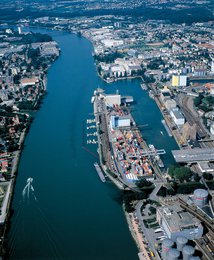Cross-border economic development
Other examples of good practice
· “BIHARTEAN,” Europe’s first cross-border Chamber of Commerce and Industry
“BIHARTEAN” is a cross-border Chamber of Commerce and Industry (CCI) established in the Basque Country in 2011 by the CCI Bayonne Pays Basque and the Càmara de Comercio de Gipuzkoa. It represents the first European example of a cross-border body created jointly by two chambers of commerce. It covers a territory including the French Basque Country and the Province of Gipuzkoa on the Spanish side, with a population of nearly one million inhabitants, and around 63,000 businesses, mainly SMEs. Its role is to stimulate, coordinate and promote cross-border projects, act as a mediator between businesses on either side of the border and develop their potential for cross-border development. Actions concern all types of information – economic, strategic advice, meetings between businesses, plans for cross-border collaboration… – and the businesses come from a wide range of sectors (commerce, services, industry, innovation, tourism, agro-food, etc.), reflecting the make-up of the economy in the two territories.
More info
· “Science Offensive” a unique cross-border initiative
The “Science Offensive” (“Offensive Sciences” in French) is an initiative, unique in Europe, that enables the support of key cross-border projects in the fields of research and innovation. Implemented within the Upper Rhine territory between France, Germany and Switzerland, its goal is to encourage researchers to make the most of research and development potential by cooperating at a cross-border level. For this, calls for proposals are jointly launched by the Interreg V Upper Rhine programme, the Grand Est region and the German states of Baden-Württemberg and Rhineland-Palatinate.
More info
· Cross-border company takeovers – a solution to the succession problem for SMEs
Each year, more than 70,000 SMEs in Germany and 60,000 SMEs in France are in search of new owners. The lack of buyers for these often family-owned businesses leads to the closure of thousands of businesses and considerable job losses. Inheriting a market ‘amputated’ of potential buyers, border areas, often considered peripheral, are often heavily penalised. ‘Intra-national’ takeovers are supported in each territory by different bodies (such as chambers of commerce), but specialised support for cross-border business takeovers is lacking on the majority of borders.
While border areas are doted with great unexploited potential, there are still obstacles to overcome. Fears and reservations arise notably around legal differences (labour law, tax law, succession rights…), as well as administrative, linguistic and cultural differences, specificities of the national markets, the banking sector’s reluctance to finance, etc.
A project launched in 2011, led by the MOT and the SaarMoselle Eurodistrict, with the support of the Caisse des Dépôts, proposed a support system for facilitating cross-border business takeovers on the French-German border, with the aim of establishing an approach that would be transposable and adaptable for other border territories. The project was organised in three steps, around three seminars bringing together specialists from either side of the border, in order to respond to the particular issues and challenges posed by cross-border company takeovers. The three topics addressed were:
– How to find a business to takeover or a potential buyer in a cross-border context
– How to support the new buyer with their financial, legal, contractual and fiscal formalities
– Businesses and cross-border economic development
More info on these seminars
This initiative represents a first step in the networking of all the concerned cross-border stakeholders, helping to stabilise and develop employment. The target audience includes the institutions specialised in the facilitation of company takeovers, the banking sector, cross-border support bodies, business consultancy firms, the relevant government authorities and national administrations (national employment services, etc.) as well as interested entrepreneurs.
Other initiatives are starting to appear. Taking inspiration from the experience of the EUREFI cross-border development fund (on the French-speaking France-Belgium-Luxembourg border), branches of the Caisse d’Epargne bank in the Saarbrücken-Lorraine area began implementation of their first support tool for SMEs on the French-German border in the summer of 2012.


